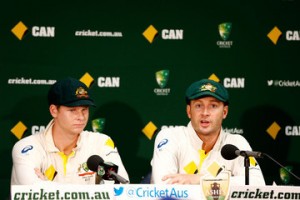
A gradual but inevitable descent into cricket-based loathing and bile.
The Bold And The Beautiful: These Are The Lives Of Test Captains
About a month ago (although it seems a lot longer than that) Mahendra Singh Dhoni was being praised as the genius behind India’s remarkable win at Lords, whilst in Alastair Cook’s case the knives were not so much as being sharpened, as being driven home with great enthusiasm. Fast forward a little and the roles have almost exactly been reversed. Cook has engineered a remarkable turnaround – he has lead the team to nirvana in record time (not our words, the words of Derek Pringle). Meanwhile Dhoni looks like a dead duck. But what really has changed in such a short space of time? Can things really have changed so much inside just a month?
The answer is probably no, not really. Both Dhoni and Cook are still the same captains they were at the start of the series. Both are inherently defensive to a fault in the field (Dhoni perhaps slightly more so, although it’s a close run thing), and tend to do most of their leadership with bat in hand. The only thing that has changed in this time is that opinion in the media has flip-flopped faster than a Conservative government staring down a host of negative opinion polls.
Cook has dominated talk in the press for months, with constant discussion of his inner steel, his stubbornness, and now, his place in the ODI setup. Discussion of India’s capitulations has largely centered on Dhoni’s role, with the performances of Virat Kholi, Cheteshwar Pujara, plus the vast late series drop offs from Murali Vijay and Bhuvenshwar Kumar, being largely set aside. Why talk about individual performers when you can just get stuck into the captain instead?
It’s hard to think of a time when there has been so much focus on captains, either positive or negative. Even when Mark Taylor went 21 Test innings without passing 50 he wasn’t subject to this sort of scrutiny. For a while it felt that Test captains were almost sacrosanct, to be criticized only begrudgingly. When Peter Roebuck dared call Ricky Ponting to account for Australia’s conduct in a Test against India in 2008, the Sydney Morning Herald thought it was such a big deal they made it front page news. Today such comment would barely cause a ripple. Unless it was written by Roebuck from beyond the grave.
To be honest, we’re not really sure what the Indian media are making of Dhoni’s position as captain. Probably a resigned acceptance that there is nobody else suitable to take his place. Or maybe it’s just been swamped under ever more IPL propaganda. In England, however, discussion of Cook’s place has been overwhelmingly positive. Aside from a small blip after that Lord’s Test, when a few in the media (specifically Michael Vaughan, plus several journalists) claimed he should step aside, most have supported him in his role. And now that he has lead England to ‘nirvana’, even those few dissenting voices have quickly changed their colours.
This opinion has largely been led by the ECB, who have backed Cook to the hilt, with inevitable consequences for certain…malcontents in the side. It is, in truth, a world apart from the experience of another Test captain who found himself in a similar position to that which Cook inhabits, namely Michael Clarke.
No Test captain has been as hounded by the media as Clarke. It’s as if after they tasted blood with Ponting, they decided to go for the throat with Clarke. Admittedly he made himself something of an easy target, but the media campaign against him was rabid in its vindictiveness. Take this article from Robert Craddock in 2010 that dismisses Clarke as a yuppie. Or this one from just twelve months ago that claims that Clarke’s lust for power was ruining Australian cricket. The accusations were always the same: Clarke owed his position to his ‘glamour’ friends, he didn’t have what it took to lead Australia and he was a poisonous influence in the dressing room. Even on the eve of the last Ashes series the release of Ricky Ponting’s autobiography was used as another excuse to stick the knife in.
Clarke shut everyone up by firstly scoring a shitload of runs. He used to be criticized as being too flaky, that his batting had too much style but not enough substance. He wasn’t the sort of batsman who would go that extra yard if it was needed. He answered his critics by piling on double hundreds against India and South Africa (plus a triple century at the SCG). And if any doubters still remained, his century against South Africa earlier this year put paid to them too. He shut critics of his captaincy up by winning the Ashes and then winning in South Africa, taking Australia (briefly) back to the number one Test spot. The recent news that Clarke was considering leaving for tours early in order to get his body ready would have, twelve months ago, been jumped on as highlighting his detachment from the rest of the team.
Cook, in comparison, hasn’t done anything on the same sort of scale to deserve the levels of praise he is receiving now. This doesn’t show up some sort of intrinsic difference between the attitudes of journalists from the two nations, but rather the appalling state of cricket journalism in general these days.
What’s lacking is any sort of insight or actual analysis. Nobody bothered trying to identify what was revealed to be the real issue at the heart of the Australian Test team, the relationship between Clarke and Mickey Arthur, and the impact that was having on the rest of the squad. Instead the problem was represented as being all Clarke’s fault. He was portrayed as being variously weak, power crazed, disinterested and vain. In the same way analysis of the English Test team has focused on Alistair Cook himself. He is, we are told, unfailingly strong, determined and committed.
This focus on the personalities of the captains themselves has turned Test cricket into a soap opera. Nobody (with a few exceptions) is brave enough to look further and enquire if it might not be institutional flaws that are the cause of a team under-performing. Those same journalists who accepted Andy Flower’s recent promotion with a shrug will probably be the same ones who will lay any blame on future English failures firmly at Cook’s feet. The same journalists who have been crowing about Australia’s recent successes haven’t bothered to dig further into whether the amount of power Darren Lehmann currently wields is for the long-term good of the team, and whether it sets a worrying precedent or not. It’s much easier to just attack individuals instead. And it’s not as if anyone remembers if you were right or wrong down the track, do they Mark Hayes?
We aren’t claiming to be bastions of journalistic integrity (or even good grammar), but these are the sorts of questions only those close enough to the actors themselves could potentially answer. Instead all we get is a series of puff pieces. Which is good news if you are dying to learn more about lambing season out on Cook’s farm, but not really so great for the rest of us.




2 Comments
Post a Comment
1
Ziko Smith
07 Sep 2014 01:39
The best part of the Craddock article is when he says that Ponting has simple tastes of cricket, greyhounds, horses, golf and football.
2
critihas
28 Aug 2014 21:34
With the world’s, including India’s English-language media merely a few clicks of the mouse away, there is much less reason for claiming “To be honest, we’re not really sure what the Indian media are making of Dhoni’s position as captain.” Unless, of course, it is to say we can’t be bothered. Cricket’s a much more global game now. Merely reading Craddock et al is really not giving you a good sense of that global perspective. Even if English-Welsh cricket is your focus, throwaway lines such as the ones you use only reveal a very outdated insularity… especially when your medium is the world wide web.